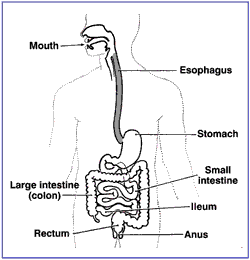Advertisement
Aaron Swartz And The Brain-Gut Connection
Two health-related points struck me in this disturbing but exceedingly smart piece in the current New Yorker about the "darker side" of Aaron Swartz, the gifted young Internet activist who hanged himself in his Brooklyn apartment in January. (The "dark" health aspects of the story were so powerful that I called an expert to find out more about the potent connection between disorders of the gut and the brain. See below.)
First, the depth of Swartz' physical distress and heightened sensitivity to everything from food to music is astounding. Reporter Larissa MacFarquhar writes:
He disliked all vegetables and refused to eat them except in extremely expensive restaurants, such as Thomas Keller restaurants. He had ulcerative colitis, a serious digestive disorder similar to Crohn’s disease; he also thought that he was a “supertaster,” experiencing sensations of taste more intensely than regular people. Partly for these reasons, he ate only foods that were white or yellow. He ate pasta, tofu, cheese, bread, rice, eggs, and cheese pizza. He was phobic about fruit and wouldn’t touch it. He rarely drank alcohol and was careful to stay hydrated. He went through four humidifiers in his apartment in Brooklyn. He said that he left San Francisco because the air-conditioning was bad. He was a supertaster in matters other than food: things always seemed much better or worse to him than they did to other people.
[From Swartz' own writing]: I recently had to sit through a performance of Bach’s Well-Tempered Clavier at the Chicago Symphony Orchestra. . . . At first it was simply boring, but as I listened more carefully, it grew increasingly painful, until it became excruciatingly so. I literally began tearing my hair out and trying to cut my skin with my nails (there were large red marks when the performance was finally over). (2006)

A doctor relative last night told me that he’d had some very painful experiences with patients with ulcerative colitis committing suicide. Apparently co-morbidity with depression is common. I’ve been thinking about it a lot for the last twelve hours. I know during the scare in 2007 he had gotten very, very sick from his U.C. He definitely didn’t seem depressed right before his death, nor for a long time previously. He wasn’t doing normal depressed-people things (like withdrawing from friends and family), let alone suicidal-people things (like giving away his stuff). However, he did commit suicide, which weighs pretty heavily on the other side of the scale. My doctor relative told me that some of his ulcerative-colitis patients seemed to be doing much better until the moment when they suddenly committed suicide, and that there’s some speculation that U.C. can alter liver functioning, which in turn can cause other medicine to cause impulsive behavior like suicide.
Ben Wikler, a friend
I spoke with Suzanne Bender, a psychiatrist at Massachusetts General Hospital and the psychiatric liaison to the pediatric gastro-intestinal service at MGH. Every Thursday, Dr. Bender sees children and adolescents with GI problems that have not responded to typical treatments, and have also caused emotional distress. She says many of these patients only get relief from their GI symptoms once coordinated care is provided, between GI and Psychiatry.
"In general, the gut and the brain talk to each other quite a bit,"
Bender said. "There is a neural feedback from the gut to the brain so chronic gastrointestinal distress can exacerbate anxiety or depression."
It also works the other way around: "Once you have anxiety or depression it can actually aggravate the gut," she said. "When a person is nervous or upset, gastrointestinal distress or diarrhea may follow. Before an event that is anxiety-provoking (flying, taking a test, or competing in any event) a person may experience significant GI discomfort."
(She made the point that there's absolutely no evidence that ulcerative colitis is caused by depression or any other mental illness, and of course, she can't comment on Swartz' case specifically.)
But, Bender said, while anyone with a chronic medical illness may be at higher risk for mental distress, "there is a basic feeling that gastrointestinal and emotional distress are uniquely linked."
"We know that stress can aggravate the gut in normal people," she said, "In a person with inflammatory bowel disease such as ulcerative colitis or Crohn's who is already suffering, we want to be aggressive in treating any mental health issue that they have." She added: "I have a lower threshold for more aggressive psychiatric treatment because I want these patients to be as resilient as possible "
Bender sent me a 2012 study published in the medical journal Gut which concluded that for "functional gastrointestinal disorders" like IBS, reflux, constipation, the "brain-gut pathway is bidirectional."
What does that mean? Bender boils down the prospective study, which followed up with more than 1,000 people after 12 years, this way:
"People with anxiety but without GI symptoms were more likely to have new symptoms of a [functional GI disorder] FGID 12 years later. So anxiety increased the chance of GI distress later on. For people with FGID at baseline, anxiety and depression scores were increased 12 years later i.e. ongoing GI distress increased the chance of anxiety and depression in the future."
The basic idea, she says, is that your central nervous system and your gut are a two-way street. "People sometimes think of their body starting from the shoulders down...I like to remind them that they have a neck."
We will never know the impact of Swartz' GI problems on his mental fragility or vice versa.
But knowing that your gut and brain have a special symbiotic connection when it comes to health might make you — and the people around you — listen to the distress signs of both a little closer.
This program aired on March 7, 2013. The audio for this program is not available.
